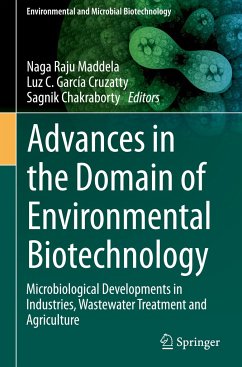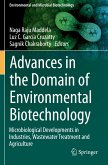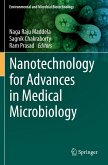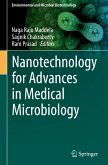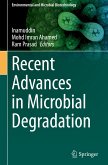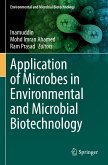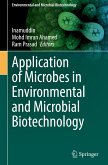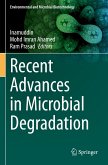Advances in the Domain of Environmental Biotechnology
Microbiological Developments in Industries, Wastewater Treatment and Agriculture
Herausgegeben:Maddela, Naga Raju; García Cruzatty, Luz C; Chakraborty, Sagnik
Advances in the Domain of Environmental Biotechnology
Microbiological Developments in Industries, Wastewater Treatment and Agriculture
Herausgegeben:Maddela, Naga Raju; García Cruzatty, Luz C; Chakraborty, Sagnik
- Gebundenes Buch
- Merkliste
- Auf die Merkliste
- Bewerten Bewerten
- Teilen
- Produkt teilen
- Produkterinnerung
- Produkterinnerung
This book complies latest advancement in the field of environmental biotechnology. It focuses on topics that comprises industrial, environment and agricultural related issues to microbiological studies and exhibits correlation between biological world and dependence of humans on it. It is designed into three sections covering the role of environmental biotechnology in industry, environmental remediation, and agriculture. Ranging from micro-scale studies to macro, it covers up a huge domain of environmental biotechnology. Overall the book portrays the importance of modern biotechnology…mehr
Andere Kunden interessierten sich auch für
![Advances in the Domain of Environmental Biotechnology Advances in the Domain of Environmental Biotechnology]() Advances in the Domain of Environmental Biotechnology139,99 €
Advances in the Domain of Environmental Biotechnology139,99 €![Nanotechnology for Advances in Medical Microbiology Nanotechnology for Advances in Medical Microbiology]() Nanotechnology for Advances in Medical Microbiology116,99 €
Nanotechnology for Advances in Medical Microbiology116,99 €![Nanotechnology for Advances in Medical Microbiology Nanotechnology for Advances in Medical Microbiology]() Nanotechnology for Advances in Medical Microbiology116,99 €
Nanotechnology for Advances in Medical Microbiology116,99 €![Recent Advances in Microbial Degradation Recent Advances in Microbial Degradation]() Recent Advances in Microbial Degradation216,99 €
Recent Advances in Microbial Degradation216,99 €![Application of Microbes in Environmental and Microbial Biotechnology Application of Microbes in Environmental and Microbial Biotechnology]() Application of Microbes in Environmental and Microbial Biotechnology193,99 €
Application of Microbes in Environmental and Microbial Biotechnology193,99 €![Application of Microbes in Environmental and Microbial Biotechnology Application of Microbes in Environmental and Microbial Biotechnology]() Application of Microbes in Environmental and Microbial Biotechnology193,99 €
Application of Microbes in Environmental and Microbial Biotechnology193,99 €![Recent Advances in Microbial Degradation Recent Advances in Microbial Degradation]() Recent Advances in Microbial Degradation216,99 €
Recent Advances in Microbial Degradation216,99 €-
-
-
This book complies latest advancement in the field of environmental biotechnology. It focuses on topics that comprises industrial, environment and agricultural related issues to microbiological studies and exhibits correlation between biological world and dependence of humans on it. It is designed into three sections covering the role of environmental biotechnology in industry, environmental remediation, and agriculture. Ranging from micro-scale studies to macro, it covers up a huge domain of environmental biotechnology. Overall the book portrays the importance of modern biotechnology technologies in solving the problems in modern day life. The book is a ready reference for practicing students, researchers of biotechnology, environmental engineering, chemical engineering and other allied fields likewise.
Produktdetails
- Produktdetails
- Environmental and Microbial Biotechnology
- Verlag: Springer / Springer Nature Singapore / Springer, Berlin
- Artikelnr. des Verlages: 978-981-15-8998-0
- 1st edition 2021
- Seitenzahl: 740
- Erscheinungstermin: 5. Januar 2021
- Englisch
- Abmessung: 241mm x 160mm x 45mm
- Gewicht: 1262g
- ISBN-13: 9789811589980
- ISBN-10: 9811589984
- Artikelnr.: 60103161
- Herstellerkennzeichnung Die Herstellerinformationen sind derzeit nicht verfügbar.
- Environmental and Microbial Biotechnology
- Verlag: Springer / Springer Nature Singapore / Springer, Berlin
- Artikelnr. des Verlages: 978-981-15-8998-0
- 1st edition 2021
- Seitenzahl: 740
- Erscheinungstermin: 5. Januar 2021
- Englisch
- Abmessung: 241mm x 160mm x 45mm
- Gewicht: 1262g
- ISBN-13: 9789811589980
- ISBN-10: 9811589984
- Artikelnr.: 60103161
- Herstellerkennzeichnung Die Herstellerinformationen sind derzeit nicht verfügbar.
Naga Raju Maddela received his M.Sc., M.Phil., and Ph.D., in Microbiology from Sri Krishnadevaraya University, Anantapuramu, India. He received "Prometeo Investigator Fellowship" from SENESCYT (Govt. of Ecuador, Ecuador), and "Postdoctoral Fellowship" from Sun Yat-sen University, China. He received external funding from "China Postdoctoral Science Foundation", (Govt. of China, China), and internal funding from "Universidad Técnica de Manabí" (UTM), Ecuador. His research interest is study of soil enzyme, biodegradation, membrane biofouling, bacterial exopolysaccharides, and biofilm formation. Worked as Assistant Professor and Head at the Department of Microbiology, National Postgraduate College, Nandyal, India. He participated in conferences and presented research data in China, Cuba, Ecuador, India and Singapore. Currently, he is working as a full-time Research Professor at the Facultad de Ciencias de la Salud & Instituto de Investigación, UTM, Portoviejo, Ecuador. Luz Cecilia García is graduated with a Ph.D., in Forest Sciences from the Universidad Austral de Chile (UACH), Valdivia, Chile. Currently, she is a full-time Professor at the Faculty of Agronomic Engineering, Universidad Técnica de Manabí (UTM), Portoviejo, Ecuador. Also, working as a Director of Institute of Investigation at UTM, Ecuador. Her line of research is "Conservation and improvement of plant genetic resources", and she directs a program of "Ecophysiology, conservation and genetic improvement of Theobroma cacao". She participated as a speaker in several National and International conferences. She has received some distinctions and awards, such as best graduate student of the doctoral program (UACH, Chile), scholarships from MECESUP (Govt. of Chile, Chile) and SENESCYT (Govt. of Ecuador, Ecuador) for her doctoral study, got a leading researcher award at the Universidad Técnica Estatal de Quevedo, Ecuador and at the UTM, best teacher of the Facultyof Agronomic Engineering, II Place in National MAGAP (Govt. of Ecuador, Ecuador) Agri-Economic Contest, GIZ (Bonn, Germany). Sagnik Chakraborty Completed M.Sc., in Biotechnology from Bangalore University, India and Ph.D., from National Institute of Technology Durgapur, Department of Biotechnology, India. His research work focused on the removal of the dyes by biomass-derived from waste materials and removal of the dyes from an industrial outlet of the textile plants - biomass derived from the various waste. He has mentored undergraduate and postgraduate students for their projects. Furthermore, Sagnik completed his Post-Doctoral Research from Hebei University of Technology, Tianjin, PR China, the fund approved by the Ministry of Education PR China. Moreover, he received an International Young Scientist Award from the National Natural Science Foundation of China with grant aid for further research. Sagnik received the Brand Ambassador Award from The Bentham Science Publisher and won several outstanding reviewing awards from Elsevier. Lately, he is engaged as Senior Researcher at Jiangsu University in the School of Environmental Science and Safety Engineering.
Part 1 Industrial Biotechnology.- 1 Lactic acid bacteria for production of platform chemicals: A dark horse in the field of industrial biotechnology.- 2 Solid-state fermentation: use of agroindustrial residues.- 3 Microemulsified systems and their environmental advantages for the oil industry.- 4 Microbial Exopolysaccharides as Biosurfactants in Environmental and Industrial Applications.- 5 Biodegradable Polymers for Food Packaging and Active Food Packaging.- Part 2 Environmental Biotechnology.- 6 3D printing technology in the environment.- 7 Biofuel: Marine Biotechnology securing alternative sources of renewable energy.- 8 Modified or functionalized natural bioadsorbents: New perspectives as regards the elimination of environmental pollutants.- 9 Electrochemical biosensing of algal toxins.- 10 Bio-inspired superoleophobic materials for oil-water separation.- 11 Biotechnology applied to treatments of agroindustrial wastes.- 12 Biocoagulants as an alternative for water treatment.- 13 Multicriteria analysis in the selection of agroindustrial waste for the production of biopolymers.- 14 Mathematical modeling challenges associated with waste anaerobic biodegradability.- 15 Anammox in Wastewater Treatment.- 16 Microbial Bioremediation: A cutting edge technology for xenobiotic removal.- 17 Conventional wastewater treatment processes.- 18 Analytical techniques/technologies for studying ecological microbial samples.- Part 3 Agricultural Biotechnology.- 19 Rhizobium diversity is the key to efficient interplay with Phaseolus vulgaris. Case of study of southern Ecuador.- 20 Algae as Environmental Biotechnological Tool for monitoring health of Aquatic Ecosystem.- 21 Contribution of the environmental biotechnology to the sustainability of the coffee processing industry in developing countries.- 22 Interactions between edaphoclimatic conditions and plant-microbial inoculants and their impacts on plant growth, nutrient uptake, and yields.- 23 Microalgae: cultivation, biotechnological, environmental and agricultural applications.- 24 Marine resources with potential in controlling plant diseases.
Part 1 Industrial Biotechnology.- 1 Lactic acid bacteria for production of platform chemicals: A dark horse in the field of industrial biotechnology.- 2 Solid-state fermentation: use of agroindustrial residues.- 3 Microemulsified systems and their environmental advantages for the oil industry.- 4 Microbial Exopolysaccharides as Biosurfactants in Environmental and Industrial Applications.- 5 Biodegradable Polymers for Food Packaging and Active Food Packaging.- Part 2 Environmental Biotechnology.- 6 3D printing technology in the environment.- 7 Biofuel: Marine Biotechnology securing alternative sources of renewable energy.- 8 Modified or functionalized natural bioadsorbents: New perspectives as regards the elimination of environmental pollutants.- 9 Electrochemical biosensing of algal toxins.- 10 Bio-inspired superoleophobic materials for oil-water separation.- 11 Biotechnology applied to treatments of agroindustrial wastes.- 12 Biocoagulants as an alternative for water treatment.- 13 Multicriteria analysis in the selection of agroindustrial waste for the production of biopolymers.- 14 Mathematical modeling challenges associated with waste anaerobic biodegradability.- 15 Anammox in Wastewater Treatment.- 16 Microbial Bioremediation: A cutting edge technology for xenobiotic removal.- 17 Conventional wastewater treatment processes.- 18 Analytical techniques/technologies for studying ecological microbial samples.- Part 3 Agricultural Biotechnology.- 19 Rhizobium diversity is the key to efficient interplay with Phaseolus vulgaris. Case of study of southern Ecuador.- 20 Algae as Environmental Biotechnological Tool for monitoring health of Aquatic Ecosystem.- 21 Contribution of the environmental biotechnology to the sustainability of the coffee processing industry in developing countries.- 22 Interactions between edaphoclimatic conditions and plant-microbial inoculants and their impacts on plant growth, nutrient uptake, and yields.- 23 Microalgae: cultivation, biotechnological, environmental and agricultural applications.- 24 Marine resources with potential in controlling plant diseases.

